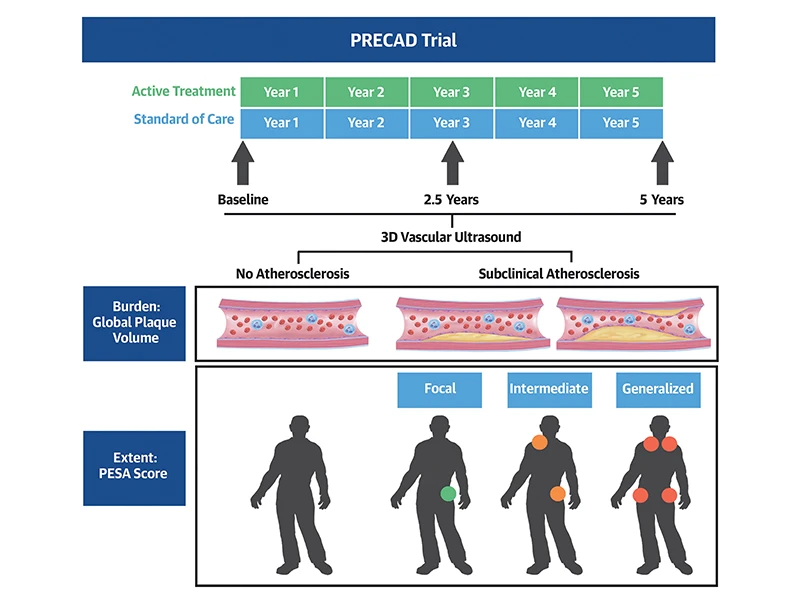A clinical trial, launched in fall 2024 by Mount Sinai Fuster Heart Hospital, is exploring strategies to prevent the progression of atherosclerotic plaque in a young population by a strict control of cardiovascular risk factors such as LDL-cholesterol (LDL-C), blood sugar, and blood pressure, in addition to new approaches for improving medication adherence in this population. Valentin Fuster, MD, PhD, President of Mount Sinai Fuster Heart Hospital and Physician in Chief of The Mount Sinai Hospital, is Principal Investigator of the trial, known as PRECAD (Prevent Coronary Artery Disease).
Growing clinical evidence shows that the atherosclerotic process starts early in life, and even in young adults deemed otherwise healthy can pave the way for cardiovascular events. This raises a question in the minds of researchers: Could an aggressive campaign to control LDL-C and other risk factors in younger adults make a difference in reducing the high incidence of cardiovascular disease (CVD), the leading cause of death and disability around the world? The team from Mount Sinai Fuster Heart Hospital is seeking answers in the PRECAD trial, which was outlined in the Journal of the American College of Cardiology in November 2023.
The PRECAD study is recruiting patients at Mount Sinai Health System sites, seeking a cohort of 1,600 young adults ages 30 to 50 with no history of coronary artery or cerebrovascular disease and LDL-C greater than 70 mg/dL. The patients must also have subclinical atherosclerosis, as assessed by 3D vascular ultrasound or by the presence of coronary artery calcium (defined as coronary artery calcium score ≥25) and/or high lifetime risk (≥30 percent) using the atherosclerotic cardiovascular disease (ASCVD) calculator; and/or intermediate 10-year risk (≥7.5 percent) using the ASCVD calculator in the presence of two risk enhancers.
The study will assess whether a comprehensive program of diet and lifestyle change along with a standard drug regimen can reduce progression of the atherosclerosis burden, known to be a surrogate for cardiovascular events. “There is currently a lack of clinical studies to support primary prevention strategies for young adults” says Dr. Fuster, who is also General Director of the Centro Nacional de Investigaciones Cardiovasculares Carlos III (CNIC). “We believe the PRECAD trial is a major step toward filling that knowledge gap, and that the greatest opportunity to impact cardiovascular disease over the life of an individual lies in a structured preventive program beginning at an early age.”

In the PRECAD trial, adults 30 to 50 years of age will be randomized to standard of care or to active treatment arm to aggressively control cardiovascular risk factors. Atherosclerotic burden and extent will be assessed by 3-dimensional (3D) vascular ultrasound of the right and left carotid and femoral arteries at baseline, and at 2.5-year and at 5-year follow-up. Atherosclerosis extent will be defined according to the presence of plaque and categorized according to the PESA (Progression of Early Subclinical Atherosclerosis) score on a 4-point scale. The primary endpoint is the change in atherosclerosis burden between baseline and 5 years.
A related study published in September 2024 in JACC, and led by Dr. Fuster, found that the progression of atherosclerosis in asymptomatic people is independently associated with the risk of dying from any cause. The results underscored the importance of early detection of atherosclerosis, while suggesting that the typically long asymptomatic phase of the disease presents a valuable window of opportunity that has not been adequately explored in the younger population.
The study, called the BioImage project, was a collaboration between Mount Sinai and the CNIC, and its goal was to determine the independent predictive value of the burden and progression of subclinical atherosclerosis above and beyond what can be predicted using established cardiovascular risk factors.
The study included 5,716 asymptomatic U.S. adults with an average age of 69 years (56.7 percent women) who were examined from 2008 to 2009. The study participants were examined with two imaging techniques. Atherosclerotic plaques in the carotid arteries were measured with vascular ultrasound, which allows detailed visualization of the interior of blood vessels, and calcification of the coronary arteries was assessed by computed tomography.
A subset of 732 study participants underwent a second vascular ultrasound scan more than eight years after the initial examination. All participants were followed up to determine the rate of death from any cause, the main outcome measure of the study.
Over the 12.4 years of follow-up, 901 (16 percent) of the participants died. Carotid plaque burden and coronary artery calcification measured at the start of the study were both associated with death from any cause. Moreover, progression of carotid atherosclerosis, a primary endpoint in the young population of PRECAD, provided further prognostic information and was independently associated with all-cause mortality.
The study concluded that detecting subclinical atherosclerosis and monitoring its progression can improve the prediction and prevention of death from any cause, offering a valuable tool for clinical practice.
The new PRECAD trial is informed by the prior studies showing that the presence of cardiovascular risk factors at early ages accelerates the development of CVD in later adulthood, and that LDL-C even at levels currently considered within normal limits is associated with the presence of subclinical atherosclerosis (SA), a condition where plaques are present in an artery without causing any symptoms or signs of disease. One study learned, for example, that some participants with LDL-C as low as 70 mg/dL had SA affecting multiple vascular territories.
“These prior observations strongly support new studies to investigate more effective LDL-C lowering strategies for primary prevention, even in individuals conventionally considered low risk,” says Dr. Fuster.
The randomized controlled PRECAD trial will assess the benefit of aggressive control of cardiovascular risk factors in healthy young adults. The hypothesis is that in subjects aged 30 to 50 years without known cardiovascular disease, maintaining low-density lipoprotein-cholesterol <55 mg/dL and strict control of blood pressure and glucose will prevent the onset of atherosclerosis and/or its progression. The primary endpoint will be the change in total atherosclerosis burden, a surrogate for cardiovascular disease.
The team will obtain a baseline 3D vascular ultrasound imaging, then randomize patients to a target LDL-C of <55 mg/dL with the PCSK9 inhibitor inclisiran as a first line therapy, as compared to the usual standard of care. The study will run for five years and include imaging (3D vascular ultrasound) at baseline, at 2.5 years, and at the end of the study. Participants will be compensated for their time ($75) after each visit.
“Results from the PRECAD trial could well form the basis for critical new targets for cardiovascular risk modification for primary prevention of atherosclerosis in young adults,” says Dr. Fuster. “Specifically, we believe that compared to standard care, maintaining LDL-C below 55 mg/dL beginning in the early adult years, in addition to strict control of other risk factors, can significantly reduce the chance of disabling cardiovascular events later in life.”
The PRECAD study is a research collaboration between the Icahn School of Medicine at Mount Sinai and Novartis Pharmaceuticals Corporation.
